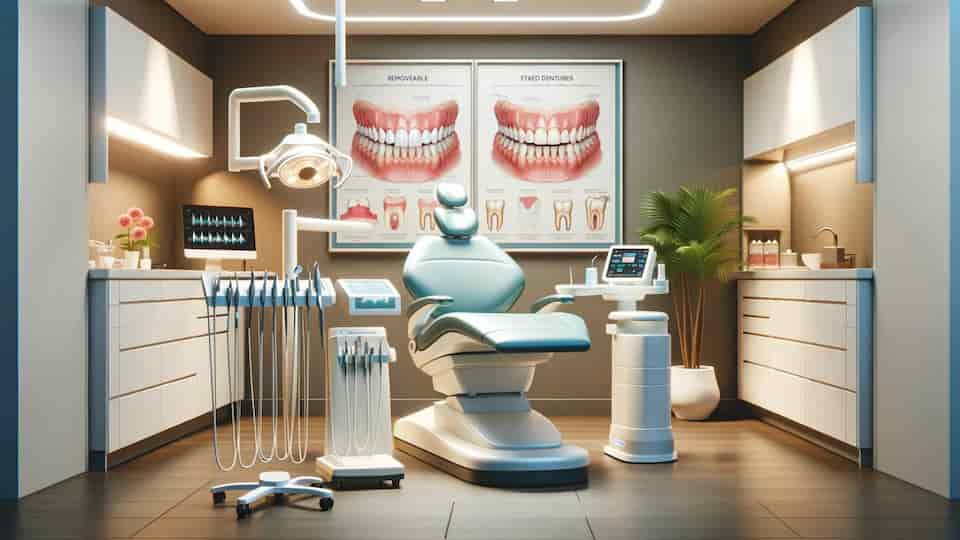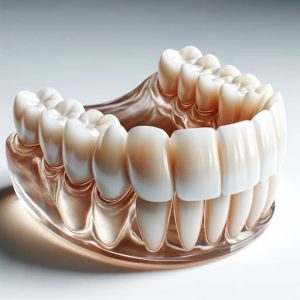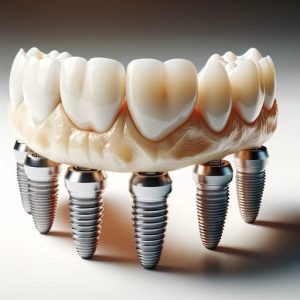Key Takeaways
- Removable dentures are often less expensive initially but may require more upkeep.
- Fixed dentures, while typically more costly upfront, offer greater stability and can feel more like natural teeth.
- Choosing the right type of denture depends on individual needs, health conditions, and lifestyle preferences.
- Both denture options have their own set of maintenance routines and care instructions.
- Consulting with a dental professional is crucial for a personalized recommendation and proper fitting.

Exploring Denture Options: Removable vs. Fixed
Defining Removable and Fixed Dentures
When it comes to dentures, seniors have two main choices: removable and fixed. Removable dentures are the traditional type that you can take out of your mouth for cleaning. They sit on the gums and are held in place with suction or adhesive. On the other hand, fixed dentures are anchored permanently in the mouth by dental implants, which are titanium screws that fuse with the jawbone. This option is designed to act like natural teeth and is not meant to be taken out.
How Each Type of Denture Functions
Understanding how each denture works is key to making the right decision. Removable dentures are convenient for cleaning and can be adjusted or replaced without much hassle. They’re a good choice if you’re looking for a less invasive and more affordable solution. Fixed dentures, though, provide a sense of permanence and are less likely to shift or require adjustments because they’re attached directly to the implants in your jawbone.
Materials Used in Removable and Fixed Dentures
The materials used in both types of dentures are designed to mimic the look and feel of natural teeth. Removable dentures are typically made of acrylic resin, which is lightweight and can be colour-matched to your existing teeth. Fixed dentures often use porcelain or acrylic teeth attached to a metal framework, which is then secured to the implants. Both materials have their own benefits, with porcelain offering a more natural appearance and acrylic being more lightweight and less expensive.
The Benefits of Removable Dentures
User-Friendly Maintenance
One of the biggest advantages of removable dentures is that they’re easy to clean. You can simply take them out and use a denture cleaner to remove any food particles or bacteria. This is especially helpful if you have dexterity issues or other health concerns that make oral hygiene challenging.
Flexibility and Adaptability for Wearers
Removable dentures offer a level of flexibility that fixed dentures can’t match. If your gums or jawbone changes shape over time, which is common among seniors, removable dentures can be adjusted or relined to fit. This adaptability can be comforting, knowing that your dentures can evolve with your changing oral health needs.
Initial Investment and Cost Considerations
Cost is a major factor when choosing dentures. Removable dentures tend to be less expensive upfront compared to fixed dentures. This can make them a more attractive option if you’re on a tight budget or if you’re looking for a cost-effective temporary solution while considering other long-term options.
Longevity and Durability of Fixed Options
When considering the long haul, fixed dentures are generally seen as the more durable choice. Because they’re anchored to dental implants, they experience less wear and tear from daily activities like eating and speaking. This connection to the jawbone also helps maintain bone health, preventing the bone loss that often occurs with removable dentures. With proper care, fixed dentures can last for many years, often outliving their removable counterparts.
Choosing Between Removable and Fixed Dentures
 The choice between removable and fixed dentures is not one to be taken lightly. It involves weighing the pros and cons of each option in the context of your personal situation. Factors such as oral health, lifestyle preferences, and financial considerations all play a role in this decision. It’s essential to consult with a dental professional who can assess your specific needs and guide you toward the best choice for your long-term oral health and comfort.
The choice between removable and fixed dentures is not one to be taken lightly. It involves weighing the pros and cons of each option in the context of your personal situation. Factors such as oral health, lifestyle preferences, and financial considerations all play a role in this decision. It’s essential to consult with a dental professional who can assess your specific needs and guide you toward the best choice for your long-term oral health and comfort.
Lifestyle Considerations and Convenience
Your daily routine and activities should influence your choice of dentures. If you lead an active lifestyle and prefer not to worry about dentures that may move or slip, fixed dentures might be the way to go. They allow for more natural eating and speaking, which can be a significant advantage. On the other hand, if you prioritize ease of cleaning and the ability to remove your dentures at will, removable options might be more appealing.
Health Conditions and Jawbone Integrity
Fixed dentures require a certain amount of jawbone density to secure the implants. If you have experienced significant bone loss, this option may require additional procedures like bone grafts, which can increase the complexity and cost. Removable dentures do not require the same level of bone integrity, making them a more suitable option for those with compromised jawbone health.
Additionally, some chronic health conditions can influence the type of dentures that are advisable. For instance, if you have a condition that affects your ability to maintain strict oral hygiene, removable dentures might be preferable because they can be cleaned more thoroughly outside of the mouth.
Cost-Benefit Analysis and Long-Term Value
While removable dentures may be more affordable upfront, they often come with additional costs over time, such as the need for adhesives, cleaning solutions, and more frequent replacements. Fixed dentures, although more expensive initially, may offer better value in the long run with fewer replacement costs and maintenance needs. It’s important to consider not just the initial price tag but the overall investment in your oral health over time.
What to Expect During the Transition to Dentures
Transitioning to dentures is a significant change, and it can take some time to adjust. Whether you choose removable or fixed dentures, you’ll need to learn how to speak and eat with them, and there may be a period of discomfort as your mouth adapts. It’s not uncommon to experience increased saliva production, mild irritation, and the need to practice speaking certain words during the initial adjustment period.
Remember, patience is key. Your mouth will need time to get used to the feel of dentures, and it’s important to follow your dental professional’s advice for a smooth transition.
Adapting to the Feel and Use of Dentures
Adapting to dentures means getting used to the feel of a foreign object in your mouth. Removable dentures, in particular, can feel bulky and may affect your sense of taste initially. Fixed dentures tend to feel more like natural teeth, but they also require an adjustment period. To help with this, start with soft foods and gradually introduce more challenging textures as you become more comfortable.
It’s also a good idea to practice speaking at home to help your tongue and facial muscles get used to the new dental appliance. Reading aloud or singing can be excellent exercises for this purpose.
Professional Fitting and Personalization Process
A proper fit is crucial for both comfort and function, which is why professional fitting and personalization are important steps in the denture process. Your dental professional will take impressions of your mouth to ensure that your dentures are tailored to your anatomy. This personalized fit helps to minimize discomfort and improve functionality, whether you’re going for removable or fixed dentures.
During follow-up appointments, your dentist will check the fit and make any necessary adjustments to ensure your dentures are as comfortable and effective as possible.
Daily Care Routines and Tips for Maintenance
Maintaining your dentures is essential for their longevity, regardless of the type you choose. For removable dentures, daily cleaning is a must. This involves brushing them with a soft-bristled brush and soaking them in a denture-cleaning solution. It’s also important to handle them with care to avoid any breakage.
Fixed dentures require a different approach. You’ll need to brush them just as you would natural teeth, and use special floss or water irrigators to clean around the implants and beneath the denture framework. Regular dental check-ups are also crucial for both types of dentures to ensure they remain in good condition and to address any issues that may arise.
Expert Insights on Denture Selection
 Comparing Durability and Maintenance Needs
Comparing Durability and Maintenance Needs
When weighing the options, it’s important to consider the durability and maintenance needs of each type of denture. Removable dentures may need to be replaced every 5 to 8 years due to wear and changes in your mouth’s shape. Fixed dentures, with proper care, can last much longer. However, both types require good oral hygiene practices and regular dental visits to maintain their condition and to monitor your oral health.
Ultimately, the best denture choice is the one that aligns with your personal needs, preferences, and health situation. By understanding the differences in maintenance, durability, and lifestyle impact, you can make an informed decision that contributes positively to your quality of life.
Recommendations Based on Individual Cases
Every individual’s case is unique, and so is the recommendation for the type of denture that would suit them best. For instance, a senior with a strong jawbone and good oral health might benefit more from the stability of fixed dentures. Conversely, someone who has experienced significant bone loss or has a medical condition that affects oral surgery outcomes may be better off with removable dentures.
It’s also essential to consider the individual’s ability to maintain their dentures. For those who may struggle with the meticulous cleaning required for fixed dentures, the simplicity of removable dentures might be a better fit. The key is to have an open and detailed discussion with your dental professional about your health, lifestyle, and personal preferences.
The Role of Dental Professionals in the Selection Process
Dental professionals play a pivotal role in the selection process of dentures. They not only assess the condition of your oral health and recommend the best option but also provide guidance on the proper care and maintenance of your dentures. Their expertise ensures that the dentures fit comfortably and function effectively, contributing to your overall quality of life.
Frequently Asked Questions
Can You Switch From Removable to Fixed Dentures?
Yes, it is possible to switch from removable to fixed dentures, but this decision should be made in consultation with your dental professional. The process involves getting dental implants, which requires adequate jawbone density and overall good health to ensure successful surgery and healing. The transition can be a significant investment in terms of time and finances, so it’s important to weigh the benefits against your specific needs and circumstances.
How Do You Know Which Type of Denture Is Right for You?
The best way to determine which type of denture is right for you is by consulting with a dental professional. They will evaluate your oral health, discuss your lifestyle and preferences, and explain the advantages and disadvantages of each option. Factors like jawbone health, gum tissue condition, and personal comfort will all be considered in making the right recommendation for you.
What Are the Latest Denture Technologies Worth Considering?
The field of dentistry is always evolving, and there are several advancements in denture technologies that are worth considering. These include digital denture design, which allows for more precise fittings, and materials that better mimic the look and feel of natural teeth. Additionally, implant-supported dentures have become more sophisticated, offering improved comfort and functionality.
How Often Do Dentures Need to Be Replaced?
Removable dentures typically need to be replaced every 5 to 8 years due to wear and changes in your mouth. However, with proper care and maintenance, fixed dentures can last much longer. It’s important to visit your dental professional regularly to ensure that your dentures are still fitting well and to make any necessary adjustments or replacements.
Remember, as your mouth changes with age, so will the fit of your dentures. Regular check-ups are crucial to maintaining optimal comfort and functionality.
Are There Alternatives to Traditional Dentures?
Yes, there are alternatives to traditional dentures. Dental implants are a popular option for those looking for a more permanent solution. They provide the look, feel, and function of natural teeth and can last a lifetime with proper care. Another alternative is a dental bridge, which is a fixed restoration that replaces one or more missing teeth by anchoring to the adjacent natural teeth. The best option for you will depend on your oral health status, the number of teeth that need replacement, and personal preference.
Ultimately, the decision between removable and fixed dentures—or considering alternative solutions—should be made after thorough discussion with your dental professional. They will help you understand the benefits and limitations of each option and guide you towards the best solution for your oral health and lifestyle.
This site has been developed by West Pro Media Services. LinkedIn
